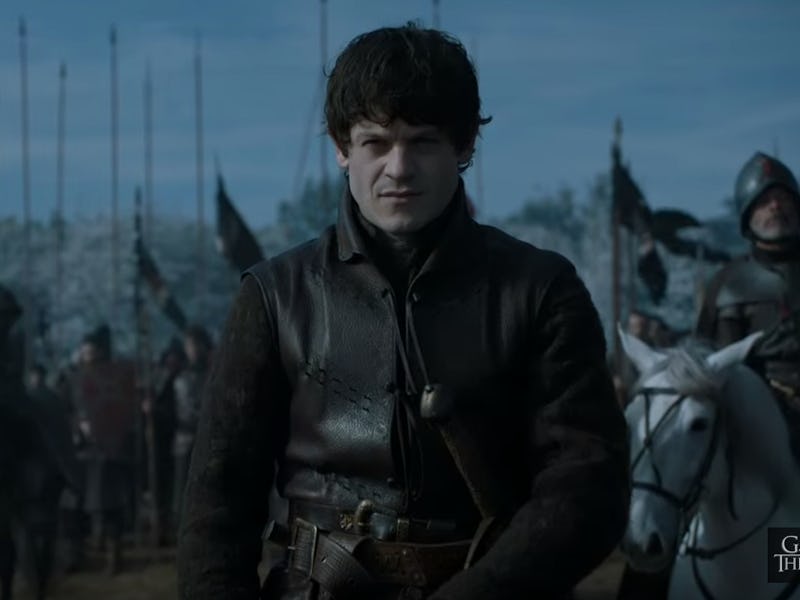In Defense of Ramsay Bolton, Seriously
Critics are calling Bolton, raging psychopath, the worst part of 'Game of Thrones'. Here's why they're wrong.

Ramsay Bolton is a terrible human being. He feeds living and dead people to dogs, murders babies and family members, rapes young girls, skins people, and loves to torture others. He needs to die, and it’s very likely that Season 6 of Game of Thrones will finally be his last.
It’s impossible to defend him as a person, but he has value on Game of Thrones as a character with dramatic agency. But many critics cite him as the show’s core weakness: The writers insist on devoting copious amounts of screen time to his atrocities and he’s not a particularly three-dimensional character. This is all true. The writers do find his antics bafflingly captivating, which creates a disconnect between audience and show.
But Ramsay, as a character, is not the weakest part of Game of Thrones. He’s got a place in its world, just as everyone else does. Iwan Rheon plays him with an impish glee that lends energy to all his scenes.
Sure, it doesn’t mean his scenes are particularly fun to watch, but they also don’t limp along the way Dorne’s scenes do, the Iron Islands scenes do, or many of Daenerys’s scenes do. We’re not supposed to like Ramsay; we are supposed to like Daenerys. We are supposed to think Euron Greyjoy and his clunky dialogue are cool. Purely on the level of the show’s strengths and weaknesses then, a tedious villain is less of an issue than a tedious character we’re supposed to be rooting for.
That brings us to the second part of the Ramsay criticism: that the show lingers on his atrocities too much, and too exploitatively — we get the point already. He’s evil, there’s no need to beat us over the head with it. This, too, is valid criticism.
But the magnitude of his atrocities have distracted us from the fact that the writing of them has actually improved. His two most egregious actions to date are his rape of Sansa in Season 5’s “Unbowed, Unbent, Unbroken”, and the murder of Walda and her newborn son in “Home.” Raping a young girl and murdering a baby and a new mother are obviously evil deeds. But if we look at the scenes, they’re a marked improvement from his unnecessarily drawn out torture of Theon in Season 3.
Sansa’s rape had its glaring issues — namely, the way the camera emphasized Theon’s emotions over Sansa’s — but the scene itself was not graphic or gruesome. The violence occurred offscreen. The same can be said of Walda’s murder. We heard her screams and the hounds, but we didn’t see extreme close-ups of the action the way we did when Ramsay crucified Theon in Season 3.
Now, it sounds absurd to say “but his atrocities have made you overlook the fact that they’re not as gruesome as they used to be!” but it’s true. Rape and baby-murder are so horrible, they make us forget the actual violence is occurring primarily in our minds.
The criticism of the Walda scene is arguing that we didn’t need to see it — but we didn’t see it. The action happens off-camera, which, Blair Witch- style, makes it more emotionally potent because we can’t help envisioning it ourselves.
The third main Ramsay criticism is that, on a show with nuanced and well-developed characters, Ramsay sticks out like a sore thumb for being cartoonishly evil. He’s certainly not the deepest character, but neither is he as shallowly drawn as The Sand Snakes (“you want a good girl but you need the bad pussy”).
When Ramsay kills Roose Bolton in “Home,” his motives are clear — his face is still and paralyzed when he hears the news that he has a baby brother. When he subsequently stabs Roose, his crazy-eyes offer as much emotion as he’s capable of. It’s telling that a sociopath who revels in torture and death looks away in the instant he murders his father.
If we want to be generous to the writers, we can even say their baffling emphasis on Ramsay is calculated. Just as Game of Thrones subverts fantasy conventions — killing its heroes, quashing its revenge quests, overturning its tropes. Perhaps, by treating Ramsay like a hero as we follow his journey from underdog to ruler, the show is once again turning a trope on its head.
This isn’t to defend Ramsay and his actions. It isn’t even to defend his prominence on the show. Ramsay is a horrible person, and the writers do indeed spend too much time emphasizing his severity, failing to grasp that most of their audience is not on board. There are many reasons he needs to die, and it’s likely he finally will quite soon. But to cite his personality as the worst part of the show is to miss the point of building a narrative. The characters we’re supposed to find engaging who fail to captivate us are the real problems.
But luckily, with a new Jon Snow and a face-lift to its pacing, Game of Thrones is trimming its fat and going in a fresh new direction.